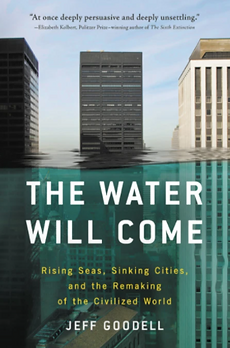The Ocean – Books

At Every Depth: Our Growing Knowledge of the Changing Oceans – Tessa Hill (2024)
"The world’s oceans are changing at a drastic pace. Beneath the waves and along the coasts, climate change and environmental degradation have spurred the most radical transformations in human history. In response, the people who know the ocean most intimately are taking action for the sake of our shared future. Citizen scientists track species in California tidepools. Researchers dive into the waters around Sydney to replant kelp forests. Scientists and First Nations communities collaborate to restore clam gardens in the Pacific Northwest.
In At Every Depth , the oceanographer Tessa Hill and the science journalist Eric Simons profile these and other efforts to understand and protect marine environments, taking readers to habitats from shallow tidepools to the deep sea. They delve into the many human connections to the ocean―how people live with and make their living from the waters―journeying to places as far-flung as coral reefs, the Great Pacific Garbage Patch, and the Arctic and Antarctic poles. At Every Depth shares the stories of people from all walks of life, including scientists, coastal community members, Indigenous people, shellfish farmers, and fisheries workers. It brings together varied viewpoints, showing how scientists’ research and local and Indigenous knowledge can complement each other to inform a more sustainable future. Poignantly written and grounded in science, this book offers a narrative perspective on the changing oceans, letting us see how our relationships to the oceans are changing too." — Goodreads

Megalodons, Mermaids, and Climate Change: Answers to Your Ocean and Atmosphere Questions – Ellen Prager, Dave Jones (2024)
"Could ancient giant sharks called megalodons still exist in the deep sea? What should you do if stung by a jellyfish? Can we predict lightning strikes and how is climate change affecting hurricanes?
With humor, easy-to-understand language, and fun illustrations, marine scientist Ellen Prager and meteorologist Dave Jones use frequently asked and zany questions about the ocean and atmosphere to combat misinformation and make science engaging and understandable for all. From dangerous marine life, coral reefs, and the deep sea to lightning, hurricanes, weather forecasting, the Sun, and climate change, they reveal what’s fact, what’s fiction, and how to find science-based answers. This book is perfect for anyone curious about the world around them, educators, science communicators, and even scientists who want to learn about and explain topics outside their expertise." — Columbia University Press

Rising: Dispatches from the New American Shore – Elizabeth Rush (2018)
"Hailed as "deeply felt" (New York Times), "a revelation" (Pacific Standard), and "the book on climate change and sea levels that was missing" (Chicago Tribune), Rising is both a highly original work of lyric reportage and a haunting meditation on how to let go of the places we love.
With every passing day, and every record-breaking hurricane, it grows clearer that climate change is neither imagined nor distant--and that rising seas are transforming the coastline of the United States in irrevocable ways. In Rising, Elizabeth Rush guides readers through some of the places where this change has been most dramatic, from the Gulf Coast to Miami, and from New York City to the Bay Area. For many of the plants, animals, and humans in these places, the options are stark: retreat or perish in place.
Weaving firsthand testimonials from those facing this choice--a Staten Islander who lost her father during Sandy, the remaining holdouts of a Native American community on a drowning Isle de Jean Charles, a neighborhood in Pensacola settled by escaped slaves hundreds of years ago--with profiles of wildlife biologists, activists, and other members of these vulnerable communities, Rising privileges the voices of those too often kept at the margins." — Goodreads

The Water Will Come – Jeff Goodell (2017)
"What if Atlantis wasn't a myth but an early precursor to a new age of great flooding? Across the globe, scientists and civilians alike are noticing rapidly rising sea levels and higher and higher tides pushing more water directly into the places we live, from our most vibrant, historic cities to our last remaining traditional coastal villages. With each crack in the great ice sheets of the Arctic and Antarctica, and each tick upwards of Earth's thermometer, we are moving closer to the brink of broad disaster.
By century's end, hundreds of millions of people will be retreating from the world's shores as our coasts become inundated and our landscapes transformed. From island nations to the world's major cities, coastal regions will disappear. Engineering projects to hold back the water are bold and may buy some time. Yet despite international efforts and tireless research, there is no permanent solution--no barriers to erect or walls to build--that will protect us in the end from the drowning of the world as we know it.
The Water Will Come is the definitive account of the coming water, why and how this will happen, and what it will all mean. As he travels across twelve countries and reports from the front lines, acclaimed journalist Jeff Goodell employs fact, science, and first-person, on-the-ground journalism to show vivid scenes from what already is becoming a water world." — Goodreads

The World Is Blue: How Our Fate and the Ocean's Are One – Sylvia A. Earle (2009)
"A Silent Spring for our era, this eloquent, urgent, fascinating book reveals how just 50 years of swift and dangerous oceanic change threatens the very existence of life on Earth. Legendary marine scientist Sylvia Earle portrays a planet teetering on the brink of irreversible environmental crisis.
In recent decades we’ve learned more about the ocean than in all previous human history combined. But, even as our knowledge has exploded, so too has our power to upset the delicate balance of this complex organism. Modern overexploitation has driven many species to the verge of extinction, from tiny but indispensable biota to magnificent creatures like tuna, swordfish, and great whales. Since the mid-20th century about half our coral reefs have died or suffered sharp decline; hundreds of oxygen-deprived "dead zones" blight our coastal waters; and toxic pollutants afflict every level of the food chain.
Fortunately, there is reason for hope, but what we do—or fail to do—in the next ten years may well resonate for the next ten thousand. The ultimate goal, Earle argues passionately and persuasively, is to find responsible, renewable strategies that safeguard the natural systems that sustain us. The first step is to understand and act upon the wise message of this accessible, insightful, and compelling book." — Goodreads
